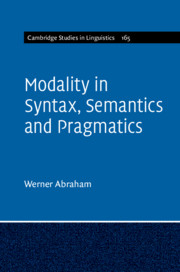Book contents
- Modality in Syntax, Semantics, and Pragmatics
- Cambridge Studies in Linguistics
- Modality in Syntax, Semantics, and Pragmatics
- Copyright page
- Dedication
- Contents
- Tables
- Preface
- Acknowledgments
- Abbreviations and Special Symbols
- Introduction
- I Modes of Modality
- II Verbal Modality
- 4 The Syntax–Semantic–Pragmatic Interface of Modal Verbs
- 5 The Perspectival Specifics of Verb Modality in German
- 6 The Syntax of Modal Verbs in German, Dutch, and English
- 7 Modal Verb Semantics
- III Adverbial Modality
- IV Covert Modality
- Bibliography
- Index
6 - The Syntax of Modal Verbs in German, Dutch, and English
from II - Verbal Modality
Published online by Cambridge University Press: 06 February 2021
- Modality in Syntax, Semantics, and Pragmatics
- Cambridge Studies in Linguistics
- Modality in Syntax, Semantics, and Pragmatics
- Copyright page
- Dedication
- Contents
- Tables
- Preface
- Acknowledgments
- Abbreviations and Special Symbols
- Introduction
- I Modes of Modality
- II Verbal Modality
- 4 The Syntax–Semantic–Pragmatic Interface of Modal Verbs
- 5 The Perspectival Specifics of Verb Modality in German
- 6 The Syntax of Modal Verbs in German, Dutch, and English
- 7 Modal Verb Semantics
- III Adverbial Modality
- IV Covert Modality
- Bibliography
- Index
Summary
We look at the comparative properties of modal verbs in English, Romance and Slavic, and investigate whether modal verbs with their typical clustering property share something with auxiliaries. One main asset is that modals verbs in German (and Dutch, but not in English) can be used as full lexical verbs. Another main asset of German and Dutch modal verbs is their contingency upon aspect and Aktionsart embeddings. In this respect. Slavic , with its strong propensity to grammatical aspect, provides confirming evidence as complex aspectual properties often give rise to modal interpretations reflecting modal verbs of German.
Keywords
- Type
- Chapter
- Information
- Modality in Syntax, Semantics and Pragmatics , pp. 157 - 187Publisher: Cambridge University PressPrint publication year: 2020

